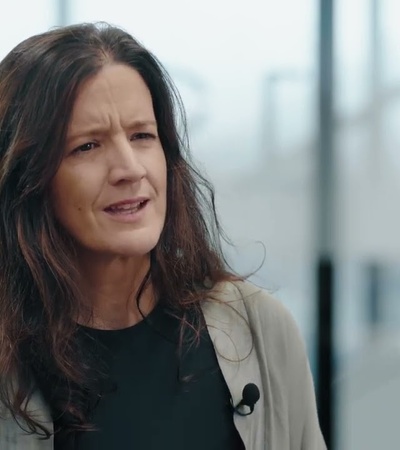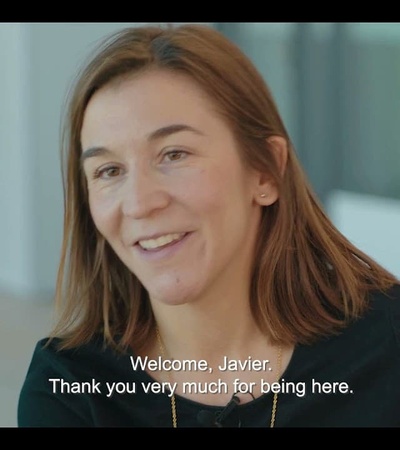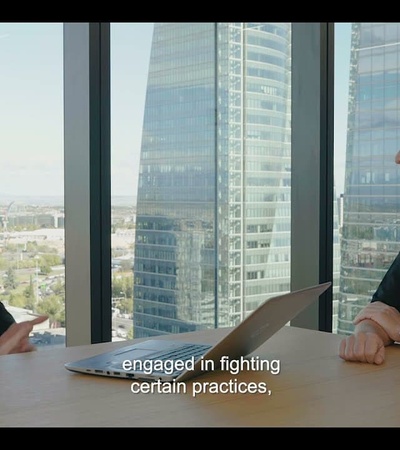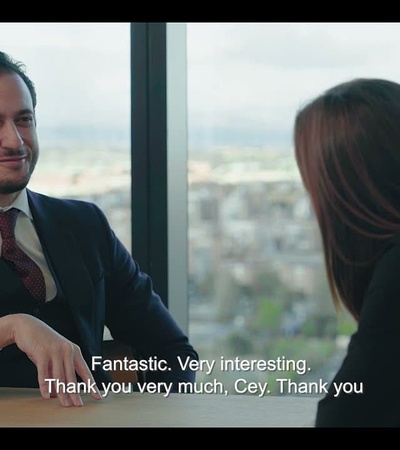- Home
- Studies
- Undergraduate Degrees
- Bachelor Of Laws (ll.b.)
UNIQUE BACHELOR OF LAWS (LL.B.)
UNIQUE BACHELOR OF LAWS (LL.B.)
The study plan of IE University's program is designed based on the prestigious academic experience of the university, the knowledge and research of our expert faculty in the field, and the institution’s close ties to the world of work.
The Bachelor of Laws (LL.B.) is an official degree, which is the first step IE Law School students have to practice law in their respective countries. The program’s study plan is designed to educate young professionals to face global challenges and develop the skills they need to be successful in the world of law. It offers the opportunity to dive deeper into different areas such as international business law, human rights and social justice, tech and digital law or Spanish law.
Students interested in continuing their academic and professional career in Spain have the option to choose the Concentration in Spanish Business Law, thereby complementing their studies by deepening their education in Spanish Law. Through practical and personalized learning, Bachelor of Laws (LL.B.) students achieve the right balance between the program’s academic components and real-world, applicable projects. This balance helps them develop profiles that adapt to the new trends of the complex world of work that they’ll face after graduation.

WANT TO KNOW MORE?
WANT TO KNOW MORE?
BACHELOR OF LAWS STUDY PLAN
BACHELOR OF LAWS STUDY PLAN
DEGREE INFORMATION AND INTERNAL QUALITY ASSURANCE SYSTEM
DEGREE INFORMATION AND INTERNAL QUALITY ASSURANCE SYSTEM
APPLICABLE REGULATIONS OF THE PROGRAM
APPLICABLE REGULATIONS OF THE PROGRAM
LEARN MORE ABOUT OUR BACHELOR OF LAWS (LL.B.)
LEARN MORE ABOUT OUR BACHELOR OF LAWS (LL.B.)
FIRST YEAR
Get ready to discover a world of law that knows no borders. In year one, you’ll become familiar with different jurisdictions and learn about the day-to-day lives of legal professionals who work internationally. You’ll get to know the legal-services market, explore various legal systems and gain practical experience of the realities of the profession. The program's Comparative Law methodology will teach you how to work in situations where different legal systems are applied. It’s an excellent way to learn the fundamentals of Private, Civil and Criminal law. You will also be able to complement your studies with the Spanish Law Concentration, preparing you from the start to build your professional career and gain the skills you need to practice law in Spain.
SECOND YEAR
Build on those foundations in year two, developing the skills needed to understand and apply the main principles of Civil Procedure. You will also acquire the analytical, interpersonal and leadership skills required of all legal professionals in today’s world. Throughout this academic year, you will tap into your entrepreneurial side while also exploring the importance and impact of technology in the field of law. Finally, you’ll be introduced to Administrative, Employment and Property Law, with special emphasis placed on Private International Law. By the end of the year, you will also have an in-depth appreciation of the most pressing legal issues facing global corporations through an understanding of Commercial Law.
THIRD YEAR
Now is the time to start honing your critical-thinking skills and legal knowledge by studying advanced subjects and participating in international competitions such as the Comparative Law in Action Challenge or LawWithoutWalls. In addition, you’ll learn the most significant aspects of civil, labor and criminal litigation processes, and explore fundamental legal problems such as civil disobedience or the concept of justice. Increased focus will be given to the management skills required to run a law firm successfully, as well as taxation, accounting and finance. You can also participate in an internship or mentoring program at prestigious firms such as PwC, Latham & Watkins or Pérez-Llorca, among others.
FOURTH YEAR
This is the year where everything you’ve learned takes shape, and you come into contact with your professional future. During this year you’ll be able to personalize your education by choosing the electives that best suit your professional preferences. There’s a wide offering, ranging from competition law to legal tech or environmental law, as well the option to specialize your studies in various jurisdictions. You will have multiple opportunities to develop your legal skills and raise your profile by participating in Moot Courts and other international competitions such as the Comparative Law in Action Challenge or LawWithoutWalls. If you’re interested in continuing your career in Spain, at the end of this year you’ll have the option to apply to study a specialized Doble Máster en Acceso a la Abogacía + LL.M. at IE Law School.
CONCENTRATION OF SPANISH BUSINESS LAW
CONCENTRATION OF SPANISH BUSINESS LAW
The Concentration in Spanish Business Law is the ideal complement to the Bachelor of Laws program for students who want to deepen their understanding of the Spanish legal system. With all modules fully taught in in Spanish, the Concentration presents a rigorous curriculum that covers the main areas of Spanish law, including Constitutional and Administrative Law, Commercial Law, Tax Law, Procedural Law and Property Law. The academics of the program are enriched with a series of extracurricular activities that bring students closer to the Spanish legal system, with opportunities ranging from visits to public institutions to networking opportunities with leading law firms and many more!
The Concentration is designed to build seamlessly on top of the Bachelor of Laws program, leveraging students’ solid analytical skills and global legal knowledge. Upon completing both the LL.B and Concentration in Spanish Business law, students are well prepared to pursue the Máster de Acceso a la Abogacía and later qualify as practicing lawyers in Spain. They graduate with a strong understanding of Spanish Law, an international perspective of the legal systems of the world and how they interact with one another.

FIRST AND SECOND YEAR
During the first two years of the program, students are immersed in a series of extracurricular activities that introduce them to the Spanish legal system and its many dimensions, including the interworking of the public and private sector, current legal issues and debates, market realities and professional career paths. These early experiences are designed to spark students’ interest in Spanish Law and continue to inspire them as they progress through the academic curriculum in later years.
1. Sessions on career pathways and public examination: Led by experts who explore the diverse career paths for Law graduates, both in the private sector (law firms, legal departments, consultancy) and the public sector (judiciary, prosecution, registries, State legal service, etc.).2. Institutional visits: Exclusive access and guided sessions at key institutions such as:
- The Spanish Congress of Deputies, to learn about the legislative process
- Madrid International Arbitration Center (CIAM), where commercial disputes are resolved
- Ilustre Colegio de la Abogacía de Madrid (ICAM), one of the leading institutions in the Spanish legal profession
3. Workshops and networking events at top-tier law firms: Students are invited to the offices of leading law firms such as Pérez-Llorca, Uría Menéndez, and Garrigues, where they meet practicing lawyers, learn about the inner workings of the firm and gain insight into the legal market and industry expectations.
4. Conferences on current legal issues: Interactive spaces where academics, professionals and students debate contemporary challenges.
THIRD AND FOURTH YEAR
The last two years of the program are dedicated to academic course work that consists of core Spanish Law courses (36 ECTS) and a final thesis project (12 ECTS). Combining both theory and practice-oriented components, the curriculum provides students with the substantive legal knowledge to navigate the key branches of Spanish law and work through legal cases with a critical lense.
Year 3:- Public Law (6 ECTS): Analysis of constitutional foundations, the organization of the State, and the functioning of public administration
- Property Law (6 ECTS): Study of legal relationships concerning property, contracts, civil liability and rights
- Commercial Law (6 ECTS): Understanding the legal framework that governs entrepreneurs, corporate entities, commercial contracts, and competition law
Year 4:
- Procedural Law (6 ECTS): In-depth study of civil, criminal, and commercial litigation, declaratory and enforcement proceedings, appeals and arbitration
- Tax Law (6 ECTS): Study of the Spanish tax system, including direct and indirect taxes, corporate taxation, and tax procedures
- Legal Challenge (6 ECTS): A practical course where students work in teams on a real-life case that encompasses different areas of Spanish law. Students are challenged to develop legal strategies and defend proposed solutions before an academic tribunal.
- Final Degree Project (12 ECTS): Students complete their final thesis paper (“TFG”) on a topic related to Spanish Law, written and defended before academic tribunal in Spanish.
Bachelor of Laws (LL.B.) Tracks
Bachelor of Laws (LL.B.) Tracks
An essential part of the Bachelor of Laws (LL.B.) learning journey is that you follow your own path and customize your program. You will be able to deepen your knowledge of areas such as International Business Law; Human Rights and Social Justice or Tech and Digital Law.
In these tracks, you’ll receive classes from industry experts, top academics, and real-world professionals, each of whom will help prepare you to face the most complex challenges in these areas.
Starting in the third year, you will be able to choose from a variety of courses that comprise one of the three tracks offered:
INTERNATIONAL BUSINESS LAW
By studying this track, you will specialize in the intersection between law and business. You will discover the legal implications of globalization and business internationalization by studying topics such as advanced corporate law, contract drafting, cross-border mergers & acquisitions, corporate finance and international tax planning, to name a few. These courses will prepare you to pursue a career as a commercial lawyer, in-house lawyer or arbitrator, among others. Real-life examples and case studies will give you practical, technologically focused experience into agreements of this kind, paving the way for your future career.
You will also be encouraged to participate in international competitions on international business law to develop your public speaking, persuasion, negotiation and advocacy skills. Additionally, we host many specific career related workshops and activities, ensuring you’re well-equipped for a range of career paths.
LAW, HUMAN RIGHTS AND SOCIAL JUSTICE
By specializing in Law, Human Rights and Social Justice, you will develop the strong analytical skills necessary to understand the challenges and stakes in human rights and social justice, such as minority rights law, access to justice, criminal prosecution of human rights violations, gender & child rights, refugees and asylum, among others.
The track in Law, Human Rights and Social Justice prepares you to pursue a career in international organizations, international courts, public servant roles, non-government agencies, or any other position where a deep knowledge of international human rights law and public international law is required.
Through a practical approach, you will also develop the necessary skills to become an advocate for human rights such as leadership, negotiation, persuasion, empathy and public speaking. You will be encouraged to participate in the prestigious European Human Rights Moot Court Competition, organized annually by the European Law Student Association (ELSA) in cooperation with the Council of Europe, with the final rounds in the European Court of Human Rights in Strasbourg.
TECH & DIGITAL LAW
While technology presents enormous opportunities for social change and business disruption, it also poses many legal and ethical challenges. The tech and digital regulatory landscape is changing rapidly. To this end, it’s essential to equip future legal professionals with the knowledge and skills to thrive in a vibrant and transforming legal landscape.
Delve deeper into tech and digital regulation such as data protection, patent and trademark law, cybersecurity, competition law, and law & policy. You will also have the opportunity to learn key technological developments and how they impact the legal field.
This track will introduce you to professional pathways such as compliance, cybersecurity and cybercrime, media and telecommunications, tech companies and more.
COMPARATIVE LAW METHODOLOGY
COMPARATIVE LAW METHODOLOGY
As today’s economies and societies become increasingly globalized, so do legal services and education. This is why we teach comparative law—to provide an entirely global approach to legal training. We apply comparative law as a methodology, followed in all our undergraduate programs across all legal disciplines, training our students to acquire a global legal mindset. Through this methodology, we compare similarities and differences across various legal systems, and offer comprehensive training by comparing civil law and common law jurisdictions.
From beginning to end, our comparative law programs prepare our students to think and act as international legal professionals, giving them a thorough understanding of legal concepts, systems, and institutions. In addition to this emphasis on comparative law, our programs feature a practice-oriented approach, helping students to deepen their understanding of legal institutions and solve problems by focusing on international legal practice. We aim to produce graduates who truly understand legal institutions from a conceptual perspective, allowing them to master the practice of international law.
Discover more about COMPARATIVE LAW METHODOLOGY
Discover more about COMPARATIVE LAW METHODOLOGY
Learning a new language can open up a world of new opportunities
Learning a new language can open up a world of new opportunities
IE University considers multiple language acquisition to be a key element of its educational model, leading to success in both work and study.
The Language Center at IEU is proud to offer students the possibility to study a wide range of languages, including French, German, Portuguese, Chinese, Arabic, Spanish, and English. With such a large variety of options, our students are able to personalize their academic path to meet their future career plans and objectives.

The Language Center at IEU
The Language Center at IEU
The Language Center helps students develop their multilingual communicative skills to help them flourish in the international labor market.
COMPETENCES
COMPETENCES
Basic competences
GENERAL COMPETENCES
- Know and understand the elements, structure, resources, interpretation and application of the legal system and be able to interpret the sources and fundamental legal concepts of each of the different systems.
- Know and understand the mechanisms and procedures for resolving legal disputes, as well as the legal position of individuals in their relations with administrative bodies and with the public authorities in general.
- Know and understand how to apply the sources’ priority criteria so as to determine the applicable rules in each case, especially criteria related to compliance with constitutional rules, principles and values.
- Interpret legal texts from an interdisciplinary perspective using legal principles and social, ethical and deontological values and principles as analytical tools.
- Deliver convincing legal arguments on theoretical questions concerning various legal matters.
- Solve case studies in accordance with current statutory law, which implies the prior preparation of material, the identification of problematic issues, the selection and interpretation of the applicable law and a reasoned explanation for those choices.
- Manage the legal language and terminology of the different branches of the law with skill and precision: Draft legal documents in an orderly and understandable manner. Communicate ideas, arguments and legal reasoning both orally and in writing using the appropriate records in each context.
- Use information and communication technologies to search for and obtain legal information (legislation and jurisprudence databases, bibliographies, etc.), and as tools for work and communication.
PROGRAM-SPECIFIC COMPETENCES
- Acquire a critical understanding of the historical foundations and principles of private and public statutory law.
- Analyze the different branches of law from the perspective of their economic, political or social functions.
- Understand the basic principles of certain non-legal matters concerning the regulation of the different branches of law, and which are important for the attainment of a multidisciplinary education.
- Apply abstract reasoning and analytical competences so as to understand economic, political and social contexts and formulate solutions to complex problems in multidisciplinary settings.
- Promote constitutional and democratic values, the principles of the rule of law and the protection of fundamental rights as a representative of the legal profession.
- Analyze the institutions of public and private law.
- Achieve a comparative perspective of law and understand the evolution of civil and common law systems on a global level.
- Identify and determine the scope of legislative changes in each area.
- Understand the main public and private institutions, their genesis and interconnection, as well as the procedures of their activities and the guarantees they provide.
- Identify, formulate and solve substantive and procedural issues related to the different branches of public law.
- Understand legal phenomena on a supranational level.
- Develop analytical and practical competences in the resolution of cases of international and European law.
- Acquire negotiation and reconciliation competences in the legal sphere.
- Think creatively and develop new ideas and concepts in the field of law.
Read our blog
Read our blog
FREQUENTLY ASKED QUESTIONS
FREQUENTLY ASKED QUESTIONS
Is a Bachelor of Law Hard?
Yes, a Bachelor of Law degree can be challenging. It requires extensive reading, critical thinking, and analytical skills. The degree involves studying complex legal concepts, case law, statutes, and legal theories. Additionally, law coursework often involves rigorous research, writing, and problem-solving tasks. However, the level of difficulty may vary depending on individual aptitude, study habits, and the specific program.
What is the hardest part of law school?
The hardest part of law school can vary for each individual, but some common challenges include the heavy workload, intense reading requirements, the need to master complex legal concepts, competitive environment, and the pressure to perform well in exams and assignments.
What year of law school is the hardest?
The difficulty of each year in law school can vary for different individuals. However, many law students find the first year to be particularly challenging due to the steep learning curve, adjustment to a new academic environment, and the introduction to foundational legal concepts and methods of analysis.
What characteristics make a good law student?
Good law students possess strong analytical and critical thinking skills, effective communication abilities, attention to detail, excellent time management, a strong work ethic, critical reading skills, and resilience.
What do law schools look for in students?
Law schools look for students with strong academic performance, analytical skills, effective communication, leadership potential, diversity, passion for law, and positive recommendations.









